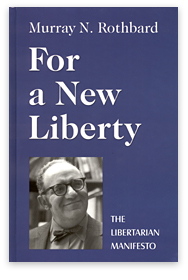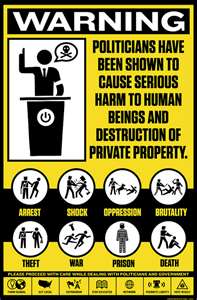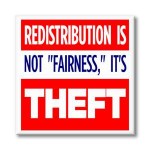
A libertarian will answer “Yes” to the following 4 questions:
- Do you own both yourself and also any justly acquired property?
- Is it wrong to initiate aggression?
- I.e. it is only permittable to use defensive force against a violation of individual rights?
- Do you believe government should be as small as possible?
- Do government employees and politicians have to follow the same laws as everyone else?
- E.g. A police officer must abide by the same laws as everyone else?
As noted by Walter Block in his article, the Non Aggression Principle is the lynchpin of libertarianism. It states simply, that it shall be legal for anyone to do anything he wants, provided only that he not initiate (or threaten) violence against the person or legitimately owned property of another. As the Non Aggression Principle is the lynchpin, private property rights based upon (Rothbardian and Lockean) homesteading are the foundation. My summarized two sentence version – –
“I believe the only time it is morally justified for anyone to initiate force or point a gun at another person is in defense to their invasion against individual rights. This moral principle has also been historically proven as the best way to produce the “greatest good” and improve the lives of all people – – including the poorest among us.”
Applying the definition of property in ourselves and the non-aggression principle to their logical end often leads the libertarian to beliefs which are often outside what is noted as “mainstream” per the narrow differences in our current two party system.
As an example, a distinct result of this belief system is the steadfast opposition to war; aka “Non-interventionism”. Even a defensive “Just War” is, at best, a necessary evil from a libertarian perspective. All war brings about mass death and human suffering while enhancing the power of the state. Put another way: War is the health of the state.
For a more thorough and inspiring explanation of the libertarian philosophy, I strongly encourage you to consider reading or listening to Murray Rothbard’s ‘For A New Liberty’.
Question3: Government should be as small as possible; completely eliminated according to some.
As with any political philosophy, there are a couple major variations within libertarianism – minarchists and anarcho-capitalists. The debate between the two camps is complex, but it boils down to the minarchists saying “government is a necessary evil”, while the other side saying “government is evil”. The Minarchists (such as Cato.org) believe in a very small government with the sole purpose of defending our individual rights. Typically this involves only basic services such as national defense, police, and courts. The Anarcho-Capitalists (such as Murray Rothbard, Lew Rockwell) advocate the complete removal of any coercive state, and believe that free markets and voluntary association can provide all services in a more moral and effective manner.
Question4 (paraphrased): Do these rules apply to individuals only, or also to governments?
As noted by Murray Rothbard
“In contrast to all other thinkers, left, right, or in-between, the libertarian refuses to give the State the moral sanction to commit actions that almost everyone agrees would be immoral, illegal, and criminal if committed by any person or group in society…if we look at the State naked, as it were, we see that it is almost universally allowed, and even encouraged, to commit all the acts which even non-libertarians concede are reprehensible crimes…The libertarian in short is almost completely the child in the fable, pointing out insistently that the emporer has no clothes…The libertarian considers conscription (military draft) as slavery on a massive scale. And since war, especially modern war, entails the mass slaughter of innocent civilians, the libertarian regards such conflicts as mass murder and therefore totally illegitimate. The State also commits theft and calls it taxation. (For A New Liberty, Chapter 2: Property and Exchange)
A word of caution though, while I and others will argue that libertarianism is the only morally sound political philosophy, libertarianism is not a full moral philosophy. As further noted by Block,
“…libertarianism does not provide a guide to proper behavior in every instance. Libertarianism is concerned with the justified use of aggression, or violence, based upon property rights, not morality.”
Libertarianism can not tell us the definitive moral aspects of charity (e.g. how much, from/to whom); but it can tell us if it is morally justified to use the muzzle of a government gun to force others to relinquish their liberty/property and adhere to our charitable beliefs.
Libertarianism can not tell us if trying to convince foreigners and their governments to be friendlier to our trade request is morally appropriate; but it can tell us if bombing foreigners (including a few civilian “collateral damage”) is justified to ensure a steady supply of oil.
Libertarianism can not tell us if a particular trade, contract or physical activity between consenting adults is moral; but it can tell us if it is justified for us to use the muzzle of a government gun to regulate, interfere, or outlaw.



what we’ve got I meant the mess we’ve got in Washington DC + the will of the people. For exlapme, I believe the Federal Reserve system is enemy #1 when it comes to getting the US on the right track, but abolishing it would require some wrangling in DC, and if the will of the people doesn’t demand its demise, then even if one were capable of abolishing it, it would just be a short matter of time before we had Federal Reserve II.My point is that we’ve got the current situation, and we have our ideals. We may reach our ideals some day, but what can be done today? What can be done in the next two years, four, eight, etc.? If we try to reach all our ideals in one day, it won’t happen, therefore it’s necessary to prioritize and then come up with plans based on what is most important, and what is feasible, while never losing focus on the ultimate goal.I think a good exlapme of the Founders acting based what was realistically possible is the issue of slavery. Although many of them wanted to abolish it entirely, they realized that if they pushed for that goal then the Constitution and creation of the United States would fail. But they knew that if they established the United States, that slavery would ultimately be abolished (although they probably didn’t anticipate that over a million lives would be wiped out in the process).